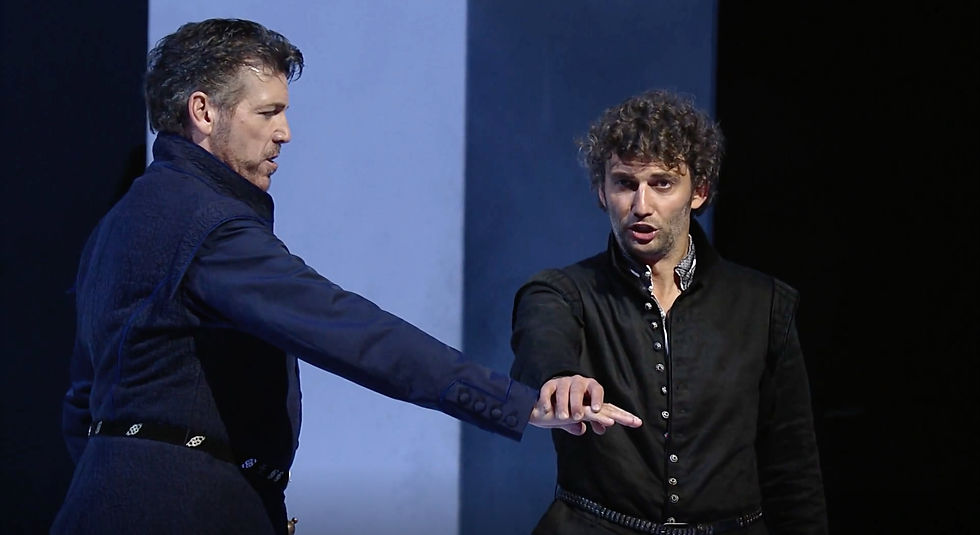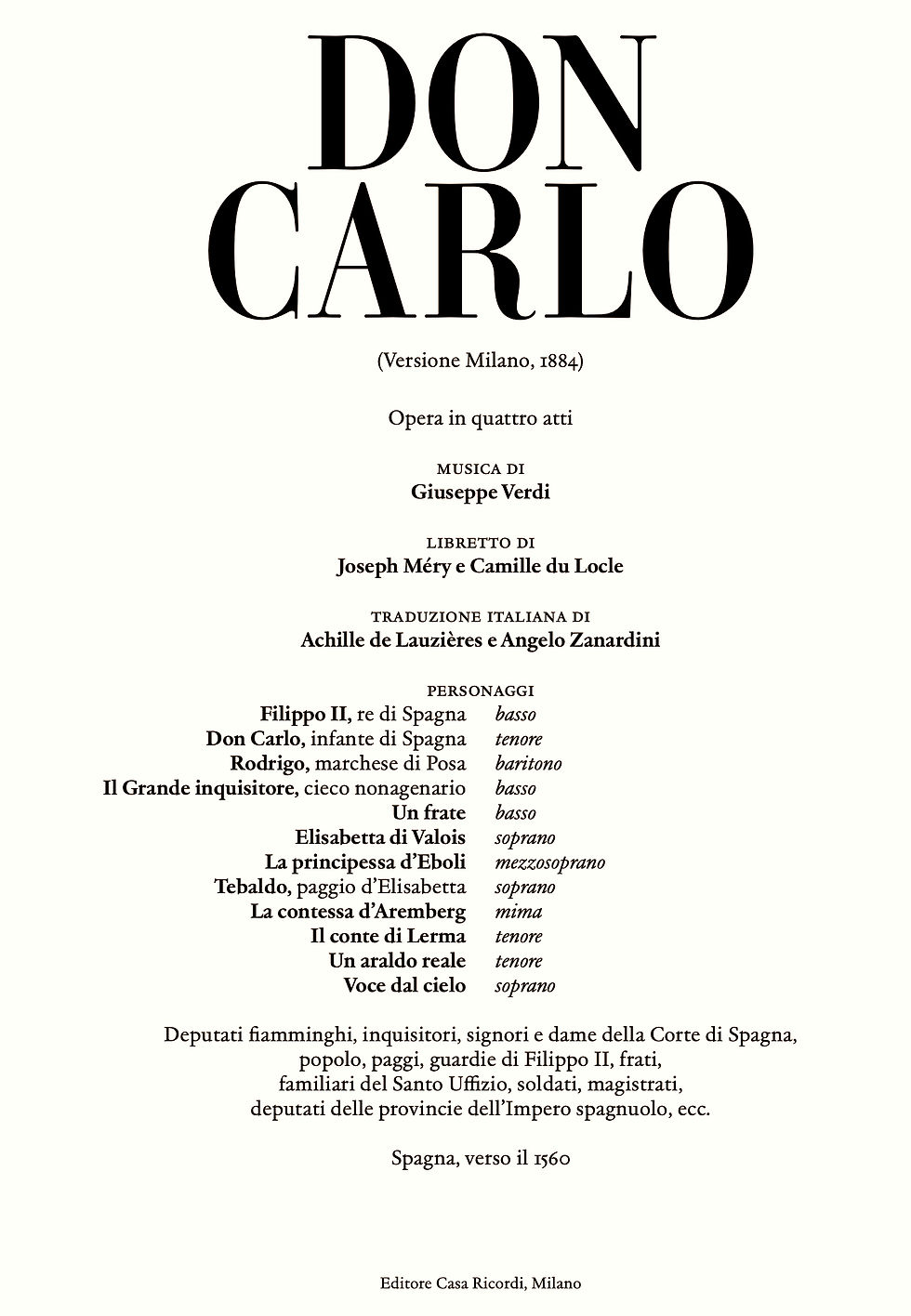A Vow of Unity for Liberty: “Dio, che nell’alma infondere”
- Dr. Mehmet Emir YILDIZ

- Jul 3, 2025
- 4 min read
Updated: Oct 30, 2025

“Dio, che nell’alma infondere,” the duet from Giuseppe Verdi’s Don Carlo, brilliantly blends the human soul’s yearning for unity and freedom with melodic mastery.
This vow of unity, sworn before God by Don Carlo and Rodrigo, reflects not only the loyalty between two friends but also the universal dimension of human solidarity and the struggles fought in the name of freedom.
In Verdi’s works, one encounters not only musical genius but also profound political themes and some of the most captivating aspects of human existence. One of the most striking examples of this is Don Carlo, his grandest and most complex work. Yet, within this monumental opera, there is a brief but immensely significant moment that crystallizes the spirit of the entire piece: the duet “Dio, che nell’alma infondere”

Historical and Political Background
Don Carlo is based on Schiller’s 1787 play and is set in the 16th century, in the court of King Philip II of Spain. During this period, the people of Flanders were suffering under the oppressive rule of the Spanish Habsburgs. Verdi uses this historical backdrop to bring to the stage the devastating effects of authoritarian regimes on individuals and the people’s quest for freedom.
Friedrich Schiller’s highly significant drama Don Karlos, Infant von Spanien was commissioned for the Paris Grand Opéra by the directors of the French national opera, who regarded Giuseppe Verdi as the foremost Italian composer. According to the agreement, Schiller’s text was translated into French by two Parisian writers, Joseph Méry and Camille du Locle. While working with his librettists, Verdi insisted on preserving scenes that particularly emphasized the conflict between freedom and authority. For example, he demanded that the Grand Inquisitor character be blind and that the famous auto-da-fé scene be explicitly included.
The French-language Don Carlos was first performed on 11 March 1867. The translation of the opera from French into Italian — thus transforming Don Carlos into Don Carlo — occurred years after its Paris premiere. Verdi revised the work multiple times. The revised version premiered at La Scala on 10 January 1884, and in this La Scala version, the duet “Dio, che nell’alma infondere,” appears in Act I.
Dramatic Context
Don Carlo, the only son of King Philip II from his first marriage, enters the scene in search of solace, standing before the tomb of his grandfather, Charles V.
The Marquis of Posa enters and embraces the Prince, who gratefully accepts his friend’s comfort. Rodrigo, also known as Posa, is one of Spain’s leading nobles and an idealistic revolutionary in the rigid environment of the Spanish court.
Posa declares that the time has come. The people of Flanders, suffering under Spanish rule, are calling upon Don Carlo to rescue them. However, the Prince is troubled by another matter. Carlo confesses that he is madly in love with Elisabeth, who, for political reasons, was forced to marry Don Carlo’s father, the despotic King Philip II, thus becoming his stepmother.
“Your mother!” cries Posa. “Great God!” Carlo, distressed, fears that even Posa has turned away from him, but Posa denies this. He urges Carlo to go to Flanders, where the oppressed people would welcome him as a liberator.
The King and Queen are approaching the chapel to pray. Carlo hesitates, but Posa rallies him, urging him to pray to God for the strength to dedicate himself to a heroic struggle for the people of Flanders. Carlo and Posa swear an oath of unity.
Dio, che nell’alma infondere
amor volesti e speme,
desio nel core accendere
tu dêi di libertà.
Giuriamo insiem di vivere
e di morire insieme;
in terra, in ciel congiungere
ci può la tua bontà.
Ah! Dio
God, who wished to fill the soul
with love and hope,
ignite in our hearts, too,
the desire for freedom.
We swear to live and die together;
may Your goodness unite us
on earth and in heaven.
Ah! God
The King and Queen enter with monks. Carlo struggles to contain his emotions under his father’s suspicious gaze. Carlo cries out that he has lost Elisabeth, who now belongs to the King. Supported by Posa, he manages to stay on his feet. Posa tells him he must remain strong. The King, Queen, and monks depart.
Carlo and Posa swear an unshakable love and commitment for the sake of liberty:
Vivremo insiem, e morremo insiem!
Sarà l’estremo anelito un grido: libertà!
Grido estremo sarà: libertà!
We will live together and we will die together!
Our final breath will be a cry: liberty!
Our last cry shall be: liberty!

Music of the Deepest Longing
“Dio, che nell’alma infondere,” conveys the depth of the vow of unity not only through its words but also through its musical fabric. Verdi constructed this duet with meticulous attention to melodic structure and orchestral color. The duet unfolds in a bright, open tonality, befitting its spiritual and hopeful character. Yet subtle modulations within the melody cast fleeting shadows of melancholy, reflecting the dramatic tension between hope and despair that grips the protagonists.
At times, the voices of the two singers intertwine so closely that they flow like a single musical line. Particularly in the phrase “morire insieme,” the tenor and baritone nearly merge on a single note. This is a powerful musical symbol of unity and shared ideals. The duet is built upon a gently swaying rhythm, giving the music an imploring, prayer-like flow. In its more animated sections, a slight increase in tempo effectively conveys the passion and determination of the vow scene. This duet demands not only vocal skill but also emotional unity and dramatic intensity. It is a unique scene that epitomizes the deepest yearnings of the human soul: unity and freedom.



